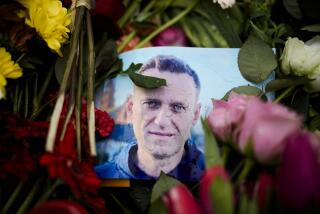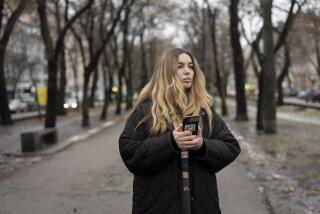Soviets to Open Prison for Wallenberg Family : Kremlin: The quest to determine the Swedish diplomat’s fate may be helped by Moscow’s decision.
- Share via
MOSCOW — The Soviet Union offered Friday to let relatives of Raoul Wallenberg tour a prison where family members say he was held as recently as 1980, and Soviet officials said they are prepared to believe the Swedish diplomat is still alive if given convincing proof, Wallenberg’s half-brother said.
“This is a big opening, and we have great hopes,” said Guy von Dardel, who has spent much of the last 44 years trying to trace his half-brother through reports from former Soviet inmates, some of whom said they saw him and others who said they heard of him through messages tapped on cell walls.
Although the Kremlin repeated that, according to its information, Wallenberg died in Moscow’s Lubyanka Prison in 1947, two years after his arrest, Soviet officials have not ruled out the possibility that more documents concerning Wallenberg might turn up, Von Dardel said.
The invitation to tour Vladimir Prison, outside Moscow, next week was extended at a meeting with officials of the KGB and the Foreign Ministry, the second such meeting in the last five days. Also present was Wallenberg’s half-sister, Nina Lagergren.
The visit to Moscow, their first, has been a moving one for Wallenberg’s relatives.
“You can imagine what it feels like to pass Lubyanka Prison and think that Raoul was there from 1945, so close to the Swedish Embassy and not able to contact anyone outside prison,” Lagergren said at a news conference. “And we didn’t know it.”
Wallenberg is credited with carrying out a daring mission in World War II, saving the lives of at least 20,000 Hungarian Jews by issuing special passports that placed them under Swedish protection.
He disappeared Jan. 17, 1945, after going to meet with the commander of Soviet troops that had driven German forces out of Budapest. Soviet officials denied any knowledge of his whereabouts until 1957, when they said he had been arrested and died, apparently of a heart attack, a decade earlier in Lubyanka Prison.
His family and the Swedish government have never accepted the Soviet statement, and scores of former prisoners have reported seeing Wallenberg in prison, most often at the Vladimir Prison.
The family believes Wallenberg was held from 1950 to perhaps as recently as 1980 in a special cell block reserved for foreigners.
In about 1980, Von Dardel said, the foreign prisoners at Vladimir were dispersed to make room for an extension of the prison hospital.
Von Dardel, who postponed his scheduled departure for home to visit the prison early next week, said he did not expect to find Wallenberg but did expect to find clues to his fate.
“We consider it important to investigate the documents, the archives and the cells,” Von Dardel said. “They (Soviet officials) claim they are quite open to the fact that he would be alive.”
“This is a beginning, somehow,” Lagergren said. “That’s what we feel.”
A Foreign Ministry official, Nikolai Uspensky, who took part in the meetings with Wallenberg’s relatives, told reporters the KGB, the Soviet security service, had questioned a number of witnesses whose names the relatives had provided Monday, some of whom said they had seen Wallenberg alive in the 1950s.
“We found their accounts to be confused, contradictory and vague,” Uspensky said. “If other names come up in the future, we will check them too, (but) the Soviet side has confirmed that the fact of Wallenberg’s death is irrevocable and nothing more can be done here.”
Von Dardel, Lagergren and Sonja Sonnenfeld, secretary of the Raoul Wallenberg Assn., said that nevertheless they are still hopeful. They said they were pleased by the Soviet willingness to examine any information the family presented.
“They agreed to receive any evidence at any time,” Sonnenfeld said.
More to Read
Sign up for Essential California
The most important California stories and recommendations in your inbox every morning.
You may occasionally receive promotional content from the Los Angeles Times.













